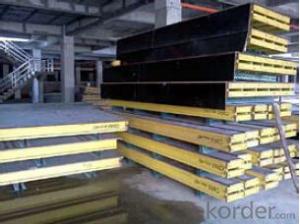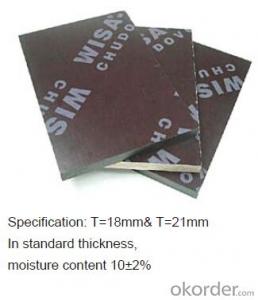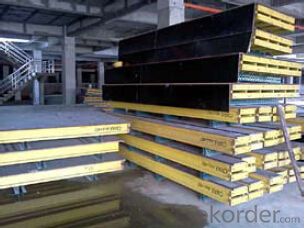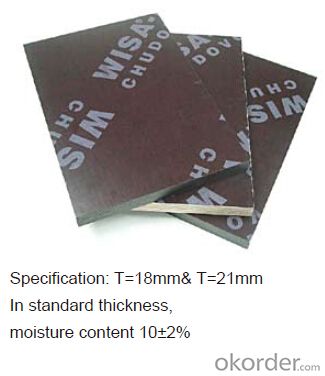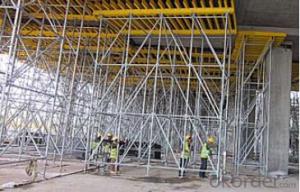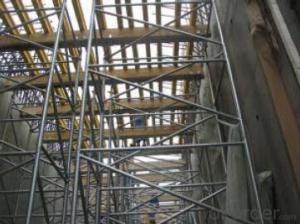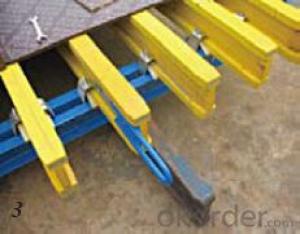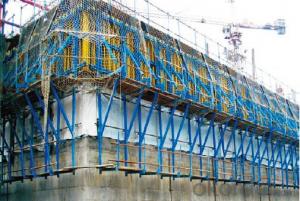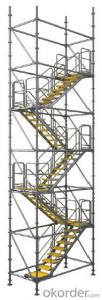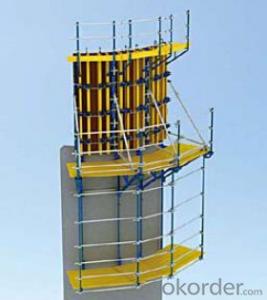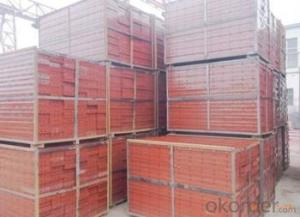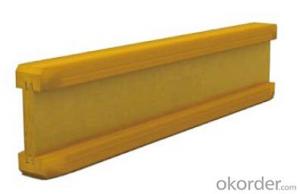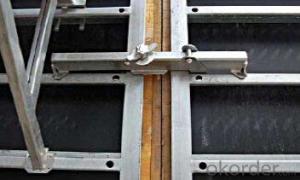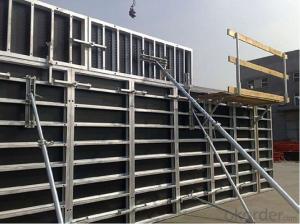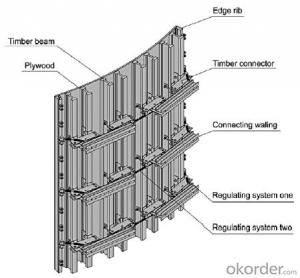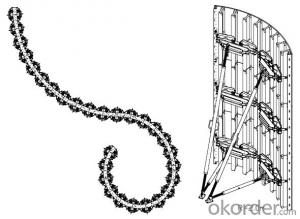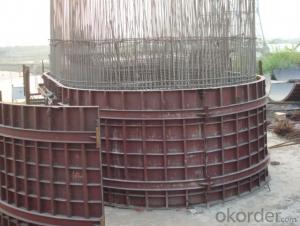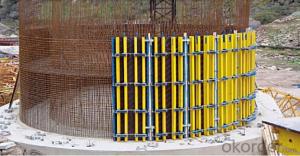Plywood-Formwork System for formwork and scaffolding
- Loading Port:
- Tianjin
- Payment Terms:
- TT OR LC
- Min Order Qty:
- 50 m²
- Supply Capability:
- 1000 m²/month
OKorder Service Pledge
Quality Product, Order Online Tracking, Timely Delivery
OKorder Financial Service
Credit Rating, Credit Services, Credit Purchasing
You Might Also Like
Plywood --- make perfect concrete surface
WISA-Form Birch is a coated special plywood using in the formwork systems where high
requirements are set on the concrete surface and the times of reuses.
With CNBM timber beam & WISA plywood, the formwork is low weight but high load capacity, it is
widely used in construction.
Characteristics:
◆ Component with high standardization.
◆ Assembling in site, flexible application.
◆ Light weight, easy transportation and storage.
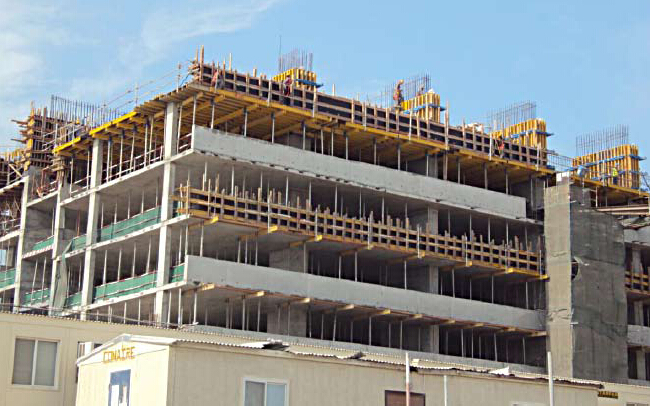
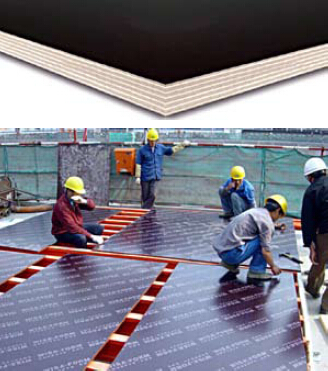
- Q: Can steel formwork be used for elevated walkways?
- Yes, steel formwork can be used for elevated walkways. Steel formwork is a versatile and durable construction material that can be used for various applications, including the construction of elevated walkways. Steel formwork systems are known for their strength and stability, making them ideal for supporting the weight and load of a walkway. The use of steel formwork for elevated walkways ensures a safe and robust structure that can withstand heavy foot traffic and adverse weather conditions. Additionally, steel formwork offers flexibility in design, allowing for the creation of customized walkways with different shapes and sizes. Overall, steel formwork is a suitable choice for constructing elevated walkways due to its strength, durability, and versatility.
- Q: How does steel formwork affect the overall structural integrity of a building?
- Steel formwork can significantly enhance the overall structural integrity of a building. Due to its high strength and durability, steel formwork provides a rigid framework for concrete placement, ensuring that the structure maintains its shape and stability during the construction process. This formwork system also allows for accurate and precise molding of concrete, resulting in uniformity and consistency in the building's structure. Additionally, steel formwork is highly resistant to deformation, which reduces the risk of any structural damage or failure. Overall, steel formwork plays a crucial role in maintaining the strength and stability of a building, contributing to its long-term structural integrity.
- Q: Are there any specific maintenance requirements for steel formwork?
- Yes, steel formwork requires regular maintenance to ensure its durability and optimal performance. Some specific maintenance requirements for steel formwork include cleaning, removing concrete residue, inspecting for any signs of damage or corrosion, and applying protective coatings to prevent rust. Additionally, proper storage and handling practices should be followed to prevent any deformation or bending of the steel formwork components.
- Q: Can steel formwork be used for both residential and industrial projects?
- Steel formwork is applicable to both residential and industrial projects, offering durability and robustness to withstand heavy loads and provide optimal support for concrete structures. Its flexibility allows for easy customization, making it suitable for various construction endeavors, including residential buildings and industrial facilities. Moreover, its strength and durability render it suitable for projects of all sizes and scopes, whether small-scale residential construction or large-scale industrial endeavors. Furthermore, steel formwork presents numerous advantages, including high reusability, low maintenance requirements, and expedited construction processes when compared to traditional formwork systems. Consequently, steel formwork emerges as a dependable and efficient choice for a wide array of construction projects, regardless of their scale or purpose.
- Q: How does steel formwork handle different concrete surface preparation techniques?
- Steel formwork proves to be a flexible and long-lasting solution for concrete construction endeavors, effortlessly accommodating diverse techniques for preparing concrete surfaces. Whether a sleek, blemish-free finish is desired or a rough texture is preferred, steel formwork can easily adapt. For achieving smooth finishes, steel formwork provides a sturdy and level surface, enabling precise leveling and alignment. The steel panels are meticulously designed to be seamless and flawless, guaranteeing a uniform concrete surface devoid of imperfections. This proves particularly advantageous for projects requiring a superior finish, such as architectural structures or decorative elements. Conversely, if a rough texture is the objective, steel formwork can effortlessly accommodate a variety of techniques to achieve the desired outcome. The formwork can be modified to incorporate patterns or textures such as wood grain or stone-like finishes, accomplished through the use of specialized liners or inserts. These liners can be affixed to the steel panels, imparting the desired texture onto the concrete surface. Furthermore, steel formwork adeptly handles other concrete surface preparation techniques such as shot blasting or acid etching. Shot blasting involves propelling steel balls onto the concrete surface, effectively eliminating contaminants and creating a rough texture. Acid etching entails the application of acidic solutions to the concrete, inducing a chemical reaction that eliminates a thin layer from the surface, thereby resulting in a textured finish. Steel formwork can withstand the impacts of shot blasting and the corrosive effects of acid etching without sustaining damage. Moreover, steel formwork offers remarkable adaptability, effortlessly customizable to meet specific project requirements. Should a particular surface preparation technique be necessary, the steel formwork can be designed accordingly to accommodate it. This versatility facilitates the achievement of a wide array of concrete surface finishes through the utilization of steel formwork. In conclusion, steel formwork is capable of accommodating various concrete surface preparation techniques, whether for smooth finishes, rough textures, or any other specific requirements. Its versatility, durability, and adaptability render it an exceptional choice for concrete construction projects that demand diverse surface finishes.
- Q: Types of building templates? What is clear water template?
- Bamboo plywood template: is the earliest use of plain bamboo plywood template, has developed a bamboo bamboo plywood coated template, bamboo plywood, wood coating or coating bamboo plywood etc.
- Q: How does steel formwork handle different concrete surface cleaning methods?
- Concrete construction projects can benefit from the durability and versatility of steel formwork. When it comes to cleaning the concrete surface, steel formwork proves to be highly effective and adaptable. Pressure washing is a common method used to clean concrete surfaces. Steel formwork can withstand the force of high-pressure water jets without sustaining any damage. The smooth and non-porous nature of the steel formwork surface facilitates the removal of dirt, debris, and other unwanted materials. By utilizing pressure washing, a smooth and even finish can be achieved. Chemical cleaning is another technique employed for cleaning concrete surfaces. Steel formwork is resistant to the majority of chemicals commonly used for cleaning purposes. This allows for the usage of various cleaning agents to eliminate stubborn stains, oil, grease, and other contaminants from the concrete surface. The chemical cleaning process can be carried out without causing any harm or deterioration to the steel formwork. Manual cleaning methods may also be utilized in certain instances. Steel formwork can withstand manual scrubbing, brushing, or scraping without any issues. The strength and durability of steel make it suitable for manual cleaning methods, which may be necessary when dealing with tough stains or debris that cannot be easily removed through other means. In conclusion, steel formwork is an ideal choice for handling various concrete surface cleaning methods. Its resistance to pressure washing, chemical cleaning, and manual cleaning ensures that the concrete surface can be effectively cleaned without damaging the formwork. This allows for a clean and visually appealing finish while maintaining the structural integrity of the formwork.
- Q: How does steel formwork affect the overall accuracy of concrete structures?
- The accuracy of concrete structures can be significantly improved through the use of steel formwork. By providing precise alignment and dimensional accuracy, steel formwork ensures a more uniform and accurate structure. To maintain the desired shape and dimensions of the concrete during pouring and curing, steel formwork offers a rigid and stable framework. This stability prevents any potential deformation or distortion, ensuring that the final structure adheres to its design specifications. Additionally, steel formwork contributes to a smoother surface finish of the concrete. The smoothness of the formwork surface reduces the likelihood of imperfections or irregularities in the final structure, ultimately enhancing its aesthetics and overall quality. Moreover, steel formwork allows for greater control and precision in the placement and positioning of reinforcement bars, which are crucial for the structural integrity of the concrete. Accurate placement of reinforcement bars guarantees proper embedding within the concrete, resulting in a stronger and more durable structure. Furthermore, the high level of reusability provided by steel formwork further enhances accuracy. Its durability allows for multiple uses, minimizing the risk of wear and tear that could affect the formwork's alignment and accuracy. In conclusion, steel formwork plays a vital role in ensuring the overall accuracy of concrete structures. It provides stability, precise alignment, smooth formwork surfaces, and reusability, all of which contribute to a more accurate and aesthetically pleasing final product.
- Q: How does steel formwork affect the overall thermal insulation of a building?
- Steel formwork has minimal impact on the overall thermal insulation of a building. Since steel is a good conductor of heat, it does not provide sufficient insulation on its own. However, when combined with appropriate insulation materials, such as foam or mineral wool, steel formwork can contribute to a well-insulated building by providing structural support while the insulation material retains heat or cold temperatures.
- Q: How does steel formwork handle different concrete mix designs?
- Steel formwork is highly versatile and can handle different concrete mix designs effectively. The strength and durability of steel make it a suitable choice for accommodating a wide range of concrete mixes. One advantage of steel formwork is its ability to withstand the pressure and weight of different concrete mix designs. Whether it is a high-strength mix or a mix with a higher water-cement ratio, steel can handle the load and prevent any deformation or collapse. This makes it an ideal choice for projects with customized concrete mixes. In addition, steel formwork provides a smooth and even surface finish to concrete structures, regardless of the mix design. This is crucial for achieving the desired aesthetic appearance of the finished product. Steel formwork ensures that the concrete is properly contained and does not leak or spill during the pouring process, resulting in a consistent and uniform finish. Furthermore, steel formwork can be easily adjusted or modified to accommodate changes in concrete mix designs. It is highly adaptable and can be customized to suit the specific requirements of each project. This flexibility allows for efficient construction processes and minimizes the need for additional formwork materials. Overall, steel formwork is a reliable and efficient choice for handling different concrete mix designs. Its strength, durability, and adaptability make it an ideal solution for construction projects that require customized concrete mixes. Whether it is a high-strength mix or a mix with specific properties, steel formwork can effectively handle the demands of various concrete designs.
Send your message to us
Plywood-Formwork System for formwork and scaffolding
- Loading Port:
- Tianjin
- Payment Terms:
- TT OR LC
- Min Order Qty:
- 50 m²
- Supply Capability:
- 1000 m²/month
OKorder Service Pledge
Quality Product, Order Online Tracking, Timely Delivery
OKorder Financial Service
Credit Rating, Credit Services, Credit Purchasing
Similar products
Hot products
Hot Searches
Related keywords
